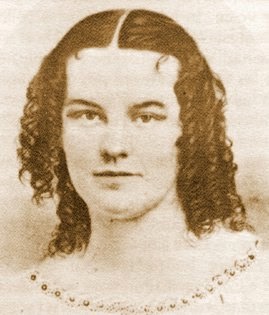But Davis was somewhat baiting Fields, the man who had a year earlier published her novella and landmark in literary realism Life in the Iron Mills. The work proved popular and Davis was being courted by another publisher — a fact which she revealed to Fields. If she could write something about the current Civil War, this publisher offered liberal payment. She was only then becoming aware that Ticknor and Fields had been more than stingy in publishing her book Margaret Howth, which also proved a solid seller. "What do you think?" she asked Fields. "Had I better still abide by the old flag? meaning T&F?" Within days, Fields sent payment for "David Gaunt" and it was published beginning in the September 1862 issue as the lead article. Still, she warned him: "Don't leave any thing out of it in publishing it... deformity is better than a scar you know."
"David Gaunt" follows the titular character, a Calvinist minister with a blind patriotism who has difficulty understanding the realities of war. It also follows a female character named Thoedora and her repressed life in conservative rural Virginia (representing "the drift of most women's lives"). Both characters, ordinary American residents generally outside of politics, find themselves on different sides of the issue of slavery, and are forced to redefine their lives amidst the harsh Civil War. From the first chapter of the story:
What kind of sword, do you think, was that which old Christian had in that famous fight of his with Apollyon, long ago? He cut the fiend to the marrow with it, you remember, at last; though the battle went hardly with him, too, for a time. Some of his blood, [John] Bunyan says, is on the stones of the valley to this day. That is a vague record of the combat between the man and the dragon in that strange little valley, with its perpetual evening twilight and calm, its meadows crusted with lilies, its herd-boy with his quiet song, close upon the precincts of hell. It fades back, the valley and the battle, dim enough, from the sober freshness of this summer morning. Look out of the window here, at the hubbub of the early streets, the freckled children racing past to school, the dewy shimmer of yonder willows in the sunlight, like drifts of pale green vapor. Where is Apollyon? does he put himself into flesh and blood, as then, nowadays? And the sword which Christian used, like a man, in his deed of derring-do?
Reading the quaint history, just now, I have a mind to tell you a modern story. It is not long: only how, a few months ago, a poor itinerant, and a young girl, (like these going by with baskets on their arms,) who lived up in these Virginia hills, met Evil in their lives, and how it fared with them: how they thought that they were in the Valley of Humiliation, that they were Christian, and Rebellion and Infidelity Apollyon; the different ways they chose to combat him; the weapons they used. I can tell you that; but you do not know — do you ? — what kind of sword old Christian used, or where it is, or whether its edge is rusted.
I must not stop to ask more, for these war-days are short, and the story might be cold before you heard it.
*For information in this post, I am heavily indebted to Sharon M. Harris's Rebecca Harding Davis and American Realism (1991).

No comments:
Post a Comment
Note: Only a member of this blog may post a comment.